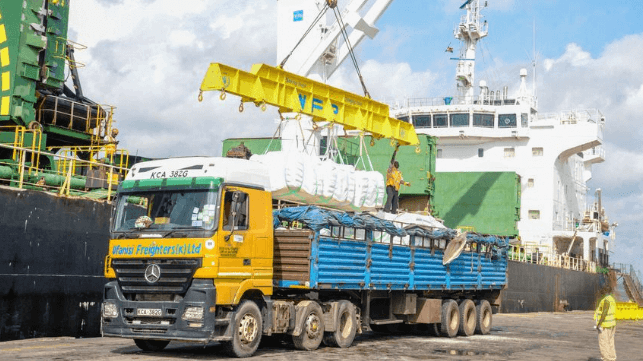Questions Over High Seas Disappearance of Russian Fertilizer Sent to Kenya

Kenyan authorities are trying to explain the whereabouts of a large consignment of fertilizer donated by Russia that failed to arrive at the Port of Mombasa. Political opponents and critics of the government are asking if it was a possible theft, while the government is defending itself asserting the missing consignment could have been a result of allowable losses during transportation.
The East African nation has been grappling with a fake fertilizer scandal, and now questions have emerged over the disappearance of 564 tons of fertilizer. that was being shipped from Russia aboard bulk carrier BBG Baise (61,000 dwt) that docked at the Port of Mombasa in May 2023.
The Liberian-flagged vessel which was built in 2021 loaded the cargo that comprised potash, urea, and NPK, and donated by Russia to support the World Food Program. It was discharged at the port of Mombasa where the plan called for it to be reformulated to produce 100,200 tonnes and distributed to farmers in Kenya.
A newly released report by Auditor General Nancy Gathungu is raising the possibility of theft citing that out of the 34,400 tons of raw fertilizer donated by Russia, the country received 33,835.9 tons, representing a shortfall of 564 tons. The consignment had been donated by the Uralchem-Uralkali Group as part of Russia’s efforts to enhance its reputation after the invasion of Ukraine. The cargo was received with great fanfare at the Mombasa Port by Kenya’s Agriculture Cabinet Secretary Mithika Linturi and Russian Ambassador to Kenya Dmitry Maksimychev.
The Auditor General’s report highlighted that while the whole consignment left Russia according to the ship’s manifest, the shortfall of the fertilizer that reached the National Cereals and Produce Board (NCPB) remains a mystery. The report says the cause of the short landing was not explained.
The Kenyan government has however said that the deficit falls within the allowable losses associated with temperature fluctuation and handling during shipment. Government officials are asserting that five percent losses are allowed during shipment due to temperature fluctuation and handling.

that matters most
Get the latest maritime news delivered to your inbox daily.
“NCPB only received them on behalf of the ministry,” Ministry of Agriculture Principal Secretary Paul Ronoh told The Star newspaper. “While receiving, the cereals board realized it was less by 1.6 percent which is within losses allowed during shipment.”
This controversy comes as a fertilizer scandal has been making headlines in Kenya. There have been allegations that government agencies were working with private companies that have been accused of distributing substandard fertilizer to farmers. Three top NCPB officials have been charged in court over the scandal with lawmakers and Kenyans demanding the sacking of Kenya’s Agriculture Cabinet Secretary Mithika Linturi.
